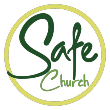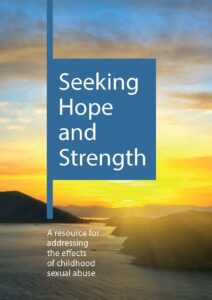“Understanding Sexual Abuse: A guide for Ministry Leaders and Survivors”
Tim Hein “Understanding Sexual Abuse: A guide for Ministry Leaders and Survivors” InterVarsity Press 2017
Tim Hein has written a very helpful and informative book for leaders of congregations about how to respond when survivors of sexual abuse disclose about their experiences. He has clearly done his research in both reading the significant practitioners in the field and engaging some of them in conversation. As well, he has talked to Safe Church Educators and his advice on how to respond is sound and insightful. This is a must read for ministers and other church leaders and that is just the first chapter!
Throughout, the book is helpful in providing understanding for church leaders. More importantly though, the book is a conversation with survivors of child sexual abuse. Tim weaves together wisdom from writers in the field and theological reflection, insights from the wider culture and personal experience to journey with readers about the continuing journey toward wholeness and healing. As such it is a courageous book.
Tim carefully explores the psychological and theological issues that create misunderstandings about sexual abuse in the life of the church and hamper the recovery of survivors. (Or worse further wounds them.) The discussion of the multiple layers of damage caused by abuse, the exploration of what recovery looks like, and the reflection on the place of anger and forgiveness in that journey are all very helpful indeed. As well, there is a chapter on worship, especially on the place of lament that many leaders of worship would do well to read and reflect on. Finally there is the gentle encouragement to take the small steps, in a myriad of ways, towards life.
This is a well written, thoughtful book that helps leaders and the general reader understand more deeply the nature of sexual abuse and how the church might respond. On a deeper level it is an invitation to develop the kind of theological understanding, community and worship life where survivors might find a welcome, and support to continue to choose life.
{excerpt from Synod website: https://sa.uca.org.au/documents/justice/Chapter-1-Understanding-Sexual-Abuse.pdf }
Tools for Listening
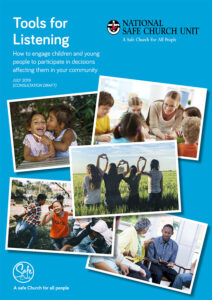
The Tools for Listening resource kit is intended to assist you in the process of consulting, involving and collaborating with children, young people and adults in any of the settings or entities of the Uniting Church – for example, schools, congregations, agencies, church councils, youth groups, presbyteries or synods.
The activity sheets and guiding documents in this toolkit are designed to be used to enable dialogues with children, either in small groups or as an individual activity, depending on age and context. They can also be used to gather information from children and parents to assist you with the planning or reviewing of programs and activities, or to seek feedback around the whole life of the “community” (congregation or school).
You can
use the toolkit at any stage of your programming.
For example:
• To consult with community members, families and children when you are planning a new program in your community
• To get feedback about a program or activity
• To include and consider feedback when reviewing programs or activities
• When people are new to your program or activity, to inform them about codes of conduct and the feedback process
The use of more creative ways of engaging the views of children is encouraged. The example feedback sheets provided could be used to ask children about things you
would like to consult about. However, it is a good idea to look beyond the opinions of adults and invite children to tell you how they would like to be consulted/engaged and what aspects they would appreciate being asked about.
Access the full resource, tools and posters here.
Principles of a Child Safe Uniting Church in Australia
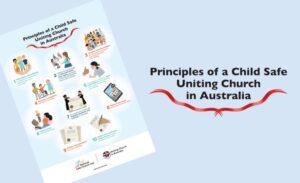
National Principles for Child Safe Organisations:
Principle #1. Child safety and wellbeing is embedded in organisational leadership, governance and culture.
Principle #2. Children and young people are informed about their rights, participate in decisions affecting them and are taken seriously.
Principle #3. Families and communities are informed and involved in promoting child safety and wellbeing.
Principle #4. Equity is upheld and diverse needs respected in policy and practice.
Principle #5. People working with children and young people are suitable and supported to reflect child safety and wellbeing values in practice.
Principle #6. Processes to respond to complaints and concerns are child focused.
Principle #7. Staff and volunteers are equipped with the knowledge, skills and awareness to keep children and young people safe through ongoing education and training.
Principle #8. Physical and online environments promote safety and wellbeing while minimising the opportunity for children and young people to be harmed.
Principle #9. Implementation of the national child safe principles is regularly reviewed and improved.
Principle #10. Policies and procedures document how the organisation is safe for children and young people.
The Uniting Church in Australia has adopted these principles.
A poster which illustrates the 10 principles has been distributed to all congregations for display. If you do not yet have one, please contact the Safe Church Team for a printed poster or click here to print one yourself.
Seeking Hope and Strength: A resource for dealing with the effects of childhood sexual abuse
If you have experienced childhood sexual abuse, this booklet has been developed
for you. Our aim is to provide information to help you understand your experience and responses to sexual abuse, reassurance that this experience of abuse does not define you and offer hope for the future.
We recognise we cannot cover every person’s experiences but we hope this booklet will have meaning for you.
This booklet may also be helpful for partners, family members and friends who are supporting a loved one dealing with the effects of childhood sexual abuse.
We encourage you to read this book in a way which best suits you. We would also suggest you take care of yourself by thinking about the best time and place to read it.
Forms for use by Ministry Agents
The following forms are provided to be used by a Minister when Long Service Leave is planned to be used or a claim against the Ministers Benefit Fund is being requested.
- The LSL form (Congregation Placement) is to be completed by the applicant and the Church council, saved and sent into the address on the form. (Agency Placement please use relevant form)
- The MBF Claim Form is to be completed by the individual’s medical officer when leave is required for an extended period of time.
The relevant By-Laws are included here for reference and guidance.
SAFE CHURCH AUDIT
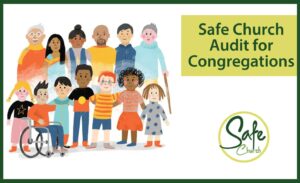
The Audit for 2023 is completed.
Thank you to those who have completed our previous Safe Church Audits. Your feedback is invaluable for us to reflect on Safe Church practices and communications, whilst helping us to understand the shape and activities of the ministry with children, families, youth and young adults
To assist in the collection of data and completion for the survey, download the questions
here.
Once you have consulted with the relevant congregational leaders, click the button below to start the survey.
CODE OF ETHICS RESOURCES
"In his own Strange Way: A Post-Christendom, Sort-of Commentary on the Basis of Union"
Geoff Thompson, “In his own Strange Way: A Post-Christendom, Sort-of Commentary on the Basis of Union” (Mediacom: Adelaide; 2020)
The subtitle of this immensely helpful and enjoyable book goes a long to explaining its purpose. It is not a full blown commentary like some earlier books on the Basis but picks key issues and themes. And a major focus is how our history as a church and our current post-Christendom context interact with the Basis of Union. I loved the summaries at the end of each short chapter which speak of the “Post-Christendom Reality and the Post-Christendom Opportunity” that we face. I found these to be invitations to understand our call as found in the Basis of Union and an invitation to fulfil our mission. Engaging, thought-provoking and nourishing – well worth the investment of time to read (and reread).
“Disturbing Much, Disturbing Many: Theology Provoked by the Basis of Union”
Geoff Thompson “Disturbing Much, Disturbing Many: Theology Provoked by the Basis of Union” Medicom: Adelaide
The first report of the Joint Commission on Church Union that led to the formation of the Uniting Church in Australia warned: “If we go forward into a union on the basis of a fresh confession of the faith of the Church, we shall disturb much and disturb many”. This book assumes that the posture of ‘disturbance’ runs through the Basis of Union, exploring its theological background – particularly its emphasis on core Christological claims – as well as bringing several of the Basis’ key claims into conversation with some of the UCA’s current theological debates.
Philip Gardner: Executive Officer Placements and Safe Church Synod of SA
PAPERS
“Growing in understanding: The church as a safe place”
This resource discusses the importance of church congregations being safe places for all people. It talks about the grooming of children, adults and congregations.
Speaking about abuse and harm is difficult in most cultures including in the life of the church. This can be especially hard for people who have experienced abuse and harm, or whose family members or friends have experienced abuse and harm.
Please seek a safe person to talk through any issues this resource raises for you personally.
SCREENING
UCA SA Screening & Authority process
Since the early 2000’s the SA Synod has required people in roles of responsibility to undergo screenings as part of our demonstration of duty of care and creating a safe place for all.
In 2019, the SA government enacted new legislation for more effective and transparent screenings that now occur through the Department for Human Services.
The Uniting Church in South Australia has adopted this as a part of our existing Screening and Authority Process.
Everyone in a role of responsibility (Appointed leaders) within the Uniting Church will need a Working with Children Check (WWCC).
A WWCC is valid for five years and is portable across roles and organisations throughout South Australia.
For those who have a WWCC with another organisation, the Uniting Church is now able to recognise it. We also need to record it within our DHS register.
While the WWCC is primarily focused on screening for risks for those in contact with children, the Uniting Church by its very nature has contact with those who are aged and vulnerable.
Designated roles within Church Council and the life of the church will also require additional checks.
See the Duty of Care Policy & information sheets for more details.
